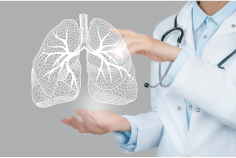The link between pneumonia and oral health
Posted on October 5, 2023 in Healthy You

Your oral health can impact your overall health in ways you might not realize. Did you know that having poor dental hygiene can increase your risk for developing pneumonia? Here, we explain the key points you need to know about how taking care of your mouth can help prevent this serious respiratory disease.
Why is this important? Pneumonia and the aging population
Pneumonia is a respiratory infection that can affect anyone, but people over the age of 65 are among those most at risk for serious complications.1 As we age, our immune systems have a harder time fighting off infections. Seniors also often live with other chronic medical conditions, and those conditions can make them more likely to develop pneumonia and worsen its toll on the body.
How does good oral health connect to pneumonia risk?
Having good oral health by brushing twice daily, flossing once daily and seeing your dentist twice a year for preventive dental exams can reduce your chances of developing bacterial pneumonia. When you have good oral health, you reduce the bad bacteria in your mouth from developing into gum disease. The bacteria that forms in your mouth does not always stay contained in your mouth. That same bacteria can travel down to your lungs and develop into pneumonia.
People who don’t have good oral health are more likely to have gum disease, and that bacteria will be more likely to spread to other areas of the body, including the lungs where bacterial pneumonia will develop.2
What does it mean to have good oral health?
People who practice good oral health may reduce their risk of developing bacterial pneumonia because they keep the bacteria in their mouth in check. How do you achieve that? Here are the pillars of good oral health for aging adults:
- Brush your teeth twice daily with a toothbrush that is easy to hold and use. Talk to your dentist if you struggle to find a brush that comfortably fits in your hand.
- Floss once daily. Flossing can be a challenge as you get older, as traditional string floss may be harder to maneuver. Talk to your dentist about options that are easier to use as you age.
- If you have dentures, always soak and brush your dentures at least once daily.
- See your dentist twice a year for preventive dental visits. These visits are an essential piece of your total health care picture, and your dentist will not only provide a deep teeth and gum cleaning but will also screen you for oral cancer and address signs of tooth decay and gum disease.
Beyond brushing: More ways to prevent pneumonia
Pneumonia is a serious condition and maintaining your oral health is a good way to minimize your chance of developing it. In addition to practicing good dental hygiene, like brushing and flossing, keeping your body healthy and strong will reduce your chances of developing this respiratory infection.
Here are some tips to keep you healthy and reduce your risk of developing pneumonia:
- Eat a nutritious diet and make physical activity part of your daily life.
- Wash your hands frequently (certainly after using the restroom and before meals).
- Regularly clean the frequently used surfaces and areas in your home.
- Talk to your doctor about vaccines, such as the pneumococcal and flu vaccines, that may reduce your risk.
- Quit smoking, as tobacco reduces your immune system’s ability to fight infection.
Your oral health affects more than your mouth
Taking care of your mouth means more than you think. Daily brushing, flossing and keeping your twice-yearly dental appointments on the calendar can help prevent a potentially serious case of pneumonia. Haven’t been to the dentist in a while? It’s never too late to schedule your next visit. If you need help finding a dentist, give Delta Dental of Iowa a call at the number on the back of your ID card or use our online Find a Provider tool.
REFERENCES:
1. West Hartford Health & Rehabilitation Center
2. Cochrane
SOURCES:
BMC Infectious Diseases
American Dental Hygienists Association
U.S. Department of Veterans Affairs